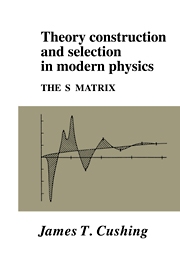Book contents
- Frontmatter
- Contents
- Preface
- Acknowledgments
- 1 Introduction and background
- 2 Origin of the S matrix: Heisenberg's program as a background to dispersion theory
- 3 Dispersion relations
- 4 Another route to a theory based on analytic reaction amplitudes
- 5 The analytic S matrix
- 6 The bootstrap and Regge poles
- 7 An autonomous S-matrix program
- 8 The duality program
- 9 ‘Data’ for a methodological study
- 10 Methodological lessons
- Appendix
- Notes
- References
- Glossary of technical terms (from physics and from philosophy)
- Some key figures and their positions
- Index
9 - ‘Data’ for a methodological study
Published online by Cambridge University Press: 05 June 2012
- Frontmatter
- Contents
- Preface
- Acknowledgments
- 1 Introduction and background
- 2 Origin of the S matrix: Heisenberg's program as a background to dispersion theory
- 3 Dispersion relations
- 4 Another route to a theory based on analytic reaction amplitudes
- 5 The analytic S matrix
- 6 The bootstrap and Regge poles
- 7 An autonomous S-matrix program
- 8 The duality program
- 9 ‘Data’ for a methodological study
- 10 Methodological lessons
- Appendix
- Notes
- References
- Glossary of technical terms (from physics and from philosophy)
- Some key figures and their positions
- Index
Summary
In the previous eight chapters we have presented a fairly detailed case study of the S-matrix program. Along the way, we often pointed out the relevance of certain developments to methodological issues in theory construction and theory choice. In the next chapter the ‘data’ from this and several other episodes in modern physics will be used as a basis for drawing some methodological lessons about theory selection in current science. This chapter is devoted to summary sketches of methodologically relevant aspects of several programs in modern physics.
We begin (Sections 9.1 and 9.2) with an overview of the ‘factual’ content of the S-matrix case study itself and some relevant methodological issues because that may help focus the reader's attention on points important for the argument of the next chapter. Also, those readers most interested in the discussion of methodological issues in Chapter 10 can use the present chapter as an easy and fairly self-contained review of the pertinent historical materials. (Recall, too, that this book has a glossary of technical terms for quick reference.) To demonstrate that those features are not peculiar to S-matrix theory alone in modern physics and, thereby, to broaden the foundation upon which subsequent arguments are made, Section 9.3 provides a summary of some other major episodes in modern physics. This includes a review of certain aspects of the old quantum theory, of early quantum field theory, of quantum electrodynamics after World War II and of gauge field theories.
- Type
- Chapter
- Information
- Theory Construction and Selection in Modern PhysicsThe S Matrix, pp. 209 - 237Publisher: Cambridge University PressPrint publication year: 1990



